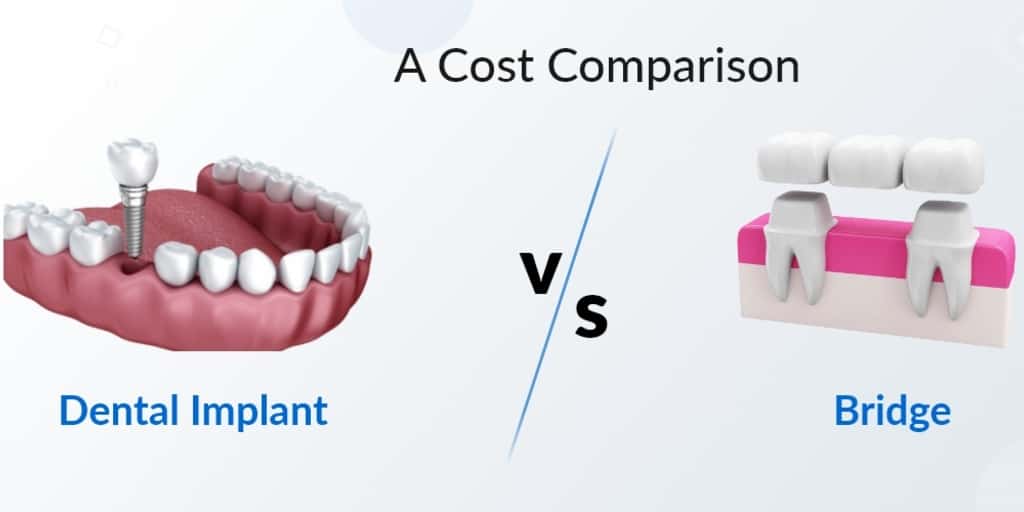Dental implants and bridges are both effective options for replacing missing teeth. However, one of the primary concerns patients have when considering these treatments is the cost. Here is a cost comparison of dental implants vs. bridges:
Initial Cost
Dental implants are generally In the same range as dental bridges .. The cost of a single dental implant can range from $1,000 to $4,000, while the cost of a bridge can range from $1200 $1,500 per tooth. However, with dental bridges, you have to have at least one tooth on either side of the missing space so you have to work on a minimum of 3 teeth. It’s important to note that dental implants are a long-term solution that can last a lifetime, while bridges may need to be replaced after 10 to 15 years because we have to shave down the teeth around the missing space to create a bridge. with dental implants, we don’t have to touch the adjacent teeth and they will stay healthier
Long-Term Cost
Dental implants are more cost-effective in the long run. Bridges may require additional maintenance or replacement because they are harder to clean, which can add to the overall cost. Additionally, dental implants are more durable and resistant to decay and damage than bridges, which means they may require fewer repairs over time. with dental Bridges, the longer the the bridge, the less durable it is because it has fewer teeth giving it support.
Insurance Coverage
Dental insurance may cover a portion of the cost of both dental implants and bridges. However, coverage varies by plan and by the type of procedure. Some plans may cover only a portion of the cost, while others may cover the entire cost. It’s important to check with your dental insurance provider to determine your coverage.
Maintenance Costs
Both dental implants and bridges require ongoing maintenance to ensure their longevity. Dental implants require regular dental checkups and cleanings, as well as proper oral hygiene. Bridges also require regular checkups and cleanings, but they may require additional maintenance such as replacement of the supporting teeth or repair of the bridge itself. With both dental implants and bridges, it is important to keep the bone and gums healthy so chronic diseases such as diabetes can damage both because they can cause more bone loss.
Functionality
In terms of functionality, dental implants are superior to bridges in several ways, especially in areas where multiple teeth are missing next to each other… Moreover, dental implants are more stable and supportive than bridges because they are fixed directly into the jawbone.
Bone Health
Dental implants can help to maintain bone health and prevent bone loss. When a tooth is lost, the jawbone can begin to deteriorate over time. Dental implants mimic the function of natural tooth roots, which helps to stimulate bone growth and maintain bone density. Bridges, on the other hand, do not provide this same level of support and do not prevent bone loss. If you have had missing teeth for a long time, you may need additional bone grafting to give enough support for the implant placement. This is especially true in the upper back teeth where the sinuses can take the space of the missing teeth. The best thing to do is to replace any missing teeth as soon as possible with a dental implant to prevent bone loss in the area.
Aesthetics
Both Dental implants and bridges can give good aesthetic results. Factors to consider are the degree of bone loss since this can make teeth look “longer”. In general, a good dentist with a cosmetic eye, can make both dental implants and bridges look natural.
Adjacent Tooth Health
Bridges require the support of adjacent healthy teeth to be anchored in place. This means that those supporting teeth may need to be filed down to accommodate the bridge, which can weaken them over time. In contrast, dental implants do not require any support from neighboring teeth, which helps to maintain their health and integrity as well as the health of the adjacent teeth
Age Considerations
Younger patients who have lost a tooth or several teeth may benefit more from dental implants since they are a long-term option that, with good care, may last a lifetime. Bridges, on the other hand, could be a better choice for senior people who might not have as long to benefit from a dental implant. some other options are dentures that are held in by dental implants to provide more support than regular dentures that tend to move easily.
Geographic Location
The cost of dental implants and bridges can vary depending on your geographic location. In general, prices tend to be higher in urban areas and lower in rural areas. It’s important to do your research and shop around to find a dentist who offers competitive prices for these treatments.
Dental implants offer greater functionality, better bone health, and improved aesthetics compared to bridges. However, the decision ultimately depends on the individual’s needs and preferences, as well as their budget and insurance coverage. It’s important to consult with a dentist to determine which option is best for you.
